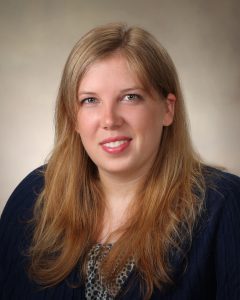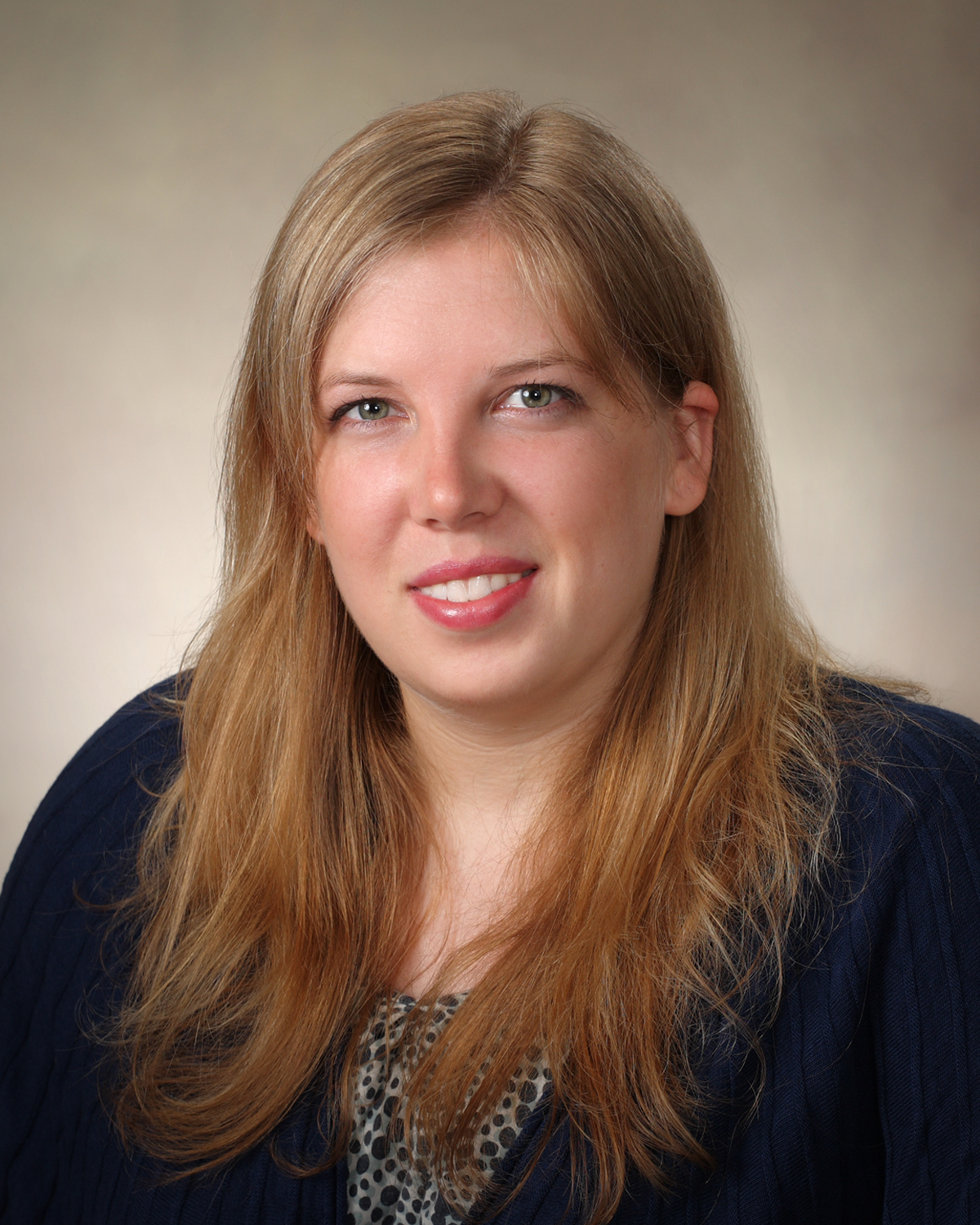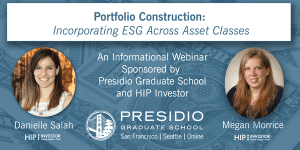 Megan Morrice, C20
Megan Morrice, C20
Leading Client and Partnership Development at HIP Investor
HIP Investor is a global leader in impact investing, Megan has experienced firsthand the positive impact that companies have when investing where their mission lies. Megan’s experience includes working as a Financial Advisor for MetLife, a financial-services and insurance wholesaler for Leisure, Werden & Terry Agency, and as a Fellow at Confluence Philanthropy, an international network that helps move philanthropy in the direction of mission-aligned investing. Megan earned an MBA in Sustainable Management from Presidio Graduate School, ranked by the New York Times as the #1 MBA to change the world. Megan is passionate about helping individuals and organizations understand their financial options, align their money with their values, and create financial products that best serve the needs of people.
______________________________________________
What is the best (career) advice you ever received?
I received great career advice from Katie Kross at my first Net Impact conference in Minneapolis. You can look at your career choices as a two by two grid, which you should have a lot of practice doing if you attend business school! One axis is the “sustainability of your role” and on the other is the “sustainability of your company.” There are some people that only want to be Chief Sustainability Officer at Patagonia, which is a great career goal. However, it might be a better fit for you to be an accountant at a sustainable company or work in a sustainability role at a company not known for their sustainability efforts. It is important to have a good understanding of what careers are a good match for your temperament and ninja skills.
Which companies or organizations do you admire? Why?
I am a big fan of companies that look at actual human behavior and match their services to not just consumer pain points – but to actual behavior. Mission Asset Fund is a great example. They recognized that people lend and borrow money from each other when bank loans aren’t an option. By using credit reporting and technology, they were able to formalize this practice to help borrowers build credit with zero-interest loans through their Lending Circles program. The program has helped many participants establish credit histories for the first time and helped improve formerly low scores.
If you could have done anything differently in your career, what would it have been?
I would have gone to Presidio Graduate School sooner! I knew I wanted to make a career transition, but it is a big step to commit the time and money to further your education.
How would you describe/define ‘sustainability’ to a 10-year-old?
What you need to do to keep something happening forever.
Often sustainability responds to wicked problems, what keeps you hopeful and productive?
As upset as I was after the results of the election, I have felt very productive and energized recently by those who are fighting for change. One of the recommendations I give to people who want to start sustainable investing is to start with your cash. Just switching to a different bank, while a bit of a hassle, can have a huge effect on the total impact of your dollars. Anecdotally, I have had more people recently tell me that they moved their bank account because of Dakota Access Pipeline concerns than I’ve heard of people moving their funds for similar reasons in the last three years.
How do you balance activism and analysis?
There is so much data in the world today that can be measured and analyzed. This is valuable and is a great way to gain insight, but there are also many cases where it makes sense to move from analyzing and counting an exact amount to valuing creating change. As cliche as the phrase is, I do think it is important to have as many tools as possible in your toolkit. In the impact investing world, I am often asked about shareholder advocacy versus divestment. If you own a (relatively) small amount ($2k) of the stock of a company, you can propose and vote on shareholder resolutions on anything that concerns you, including social, environmental or governance concerns. With divestment, you sell your holdings completely, such as with the popular Divest-Invest campaign against holding funds with fossil fuels in which over 51k people have pledged over 5 trillion dollars. Being involved in work in an industry that lets me incorporate both activism and analysis is a great balance for me.
How did you come to find out about PGS? Why did you choose it above others?
I discovered that Green MBAs existed thanks to an article in Delta Sky Miles Magazine. Several years later when I started researching MBAs with a focus on sustainability, I discovered Presidio Graduate School (PGS). Although I looked at a couple different programs, ultimately, I chose PGS because of the flexibility in their program. I was living in Los Angeles at the time, but I could commute to San Francisco once a month. I also knew that I could switch to being a full-time student when the time was right.
How has being a Presidian influenced/helped shape who you are today?
My first semester at PGS, when we were learning about systems thinking it made me think back to my admissions essay. I had written about how as an undergraduate, I always said I would love to have five minors and no major. I always found interesting connections between all my classes in different disciplines. Common threads would appear in my mind, and I would apply a concept from one class to another class where we hadn’t even learned about it. Until PGS, I didn’t have the language to describe myself as a system thinker. Until a class my first year (Effective Management and Communication), I didn’t have the confidence to say “until PGS, I didn’t have the language or confidence to describe myself as a system thinker.” PGS also introduced me to theories like permaculture and biomimicry, and how the business application made so much sense to me. Why try to reinvent the wheel? Why try to recreate a system that nature has spent millions of years perfecting?
What is the most valuable takeaway from your PGS experience? What’s your strongest memory from your time as a PGS student? or Did you have a defining moment or teacher at PGS? If so, What was it? What tools and skills did you acquire at PGS that you use today?
I came to PGS to refocus my career on impact investing, and I thought after school I would go back to being a financial advisor. The work I did in Kenya really helped refine my post-PGS career goals.
While at school, I was lucky enough to travel on two International Sustainability Club (ISC) trips. My first ISC trip was to Kenya with the microfinance organization Zawadisha. Instead of lending money, they give women loans for critical eco-friendly products, such as solar lamps or clean cookstoves.
My team was tasked with creating content for a financial literacy training for the group leaders to help the women who participate in the loans. It was critically important for me to use generative listening skills and to have an iterative process, all skills we had been focusing on in my classes at PGS. Of course, my work as a financial advisor in America didn’t apply all to women who were living off of fewer than two dollars a day.
Table banking was a new concept to me, as well as M-PESA. M-PESA is a SMS-based payment system that now almost half of the country’s GDP flows through. What started as a way to send money has become a de facto full banking system to over 10 million customers. By surveying the women on what financial successes they had, I was able to come up with a flexible training for the leaders. I was inspired to examine ways that table banking or mobile banking could help women who are struggling here in the United States.
How would you describe the ideal PGS student? What advice would you give to people considering coming to PGS?
One of the things I loved about PGS was the professional diversity of my teams, from the travel industry to PR to professional sports and everything in between. Everyone at the school, no matter the industry they came from, is united by a focus on the mission. I imagine it was a much different experience than getting an MBA with an emphasis in finance with people who had spent their whole careers in finance. I would love to see the diversity at PGS continue to expand. When I was making my decision to come to PGS, it was the visit that sealed my decision. If you are considering going to PGS, I would schedule a classroom visit as soon as you can.
Register for the next HIP Investors webinar 9/7/17 @ 1:00 HERE.
Environmental, Social and Governance (ESG) Principles for Your Investments


